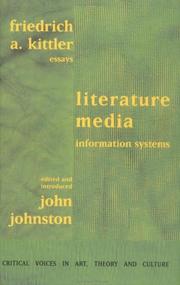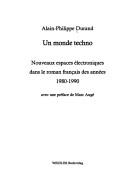| Listing 1 - 10 of 172 | << page >> |
Sort by
|
Book
Year: 2020 Publisher: Florence : Firenze University Press,
Abstract | Keywords | Export | Availability | Bookmark
 Loading...
Loading...Choose an application
- Reference Manager
- EndNote
- RefWorks (Direct export to RefWorks)
Over the last decade, considerable attention has been paid to how the information society and digital tools are changing the cultural and linguistic scene where literary production takes place. But what are the roots of this change and of the consequent debate? This book was created with the aim of studying how two of the most influential Italian writers of the second half of the 20th century, Italo Calvino and Paolo Volponi reacted to the initial diffusion of information technologies in the mid-fifties by wondering about the function of literary language and artistic creativity in a context of intelligent machines and mass information. Eleonora Lima carefully analyses some of the lesser known texts by the two authors, and discusses the opposition between the natural and the technological world in a society where information has become a product and a good to be exploited. She reconstructs the prerogatives and identities of biological and mechanical subjects, as defined by the then emerging cybernetic science. Finally, she investigates the political role of television representation in the years of dispute and terrorism. The comparative analyses, organized by thematic nuclei which are preceded by an overall historical and methodological framework, reveal the ways in which a 'remediation' process took place in writing, and show how, with new and often divergent strategies, the two narrators have faced the need to adapt literary tools to the changed communication context in a very personal way.
Book
Year: 2020 Publisher: Florence : Firenze University Press,
Abstract | Keywords | Export | Availability | Bookmark
 Loading...
Loading...Choose an application
- Reference Manager
- EndNote
- RefWorks (Direct export to RefWorks)
Over the last decade, considerable attention has been paid to how the information society and digital tools are changing the cultural and linguistic scene where literary production takes place. But what are the roots of this change and of the consequent debate? This book was created with the aim of studying how two of the most influential Italian writers of the second half of the 20th century, Italo Calvino and Paolo Volponi reacted to the initial diffusion of information technologies in the mid-fifties by wondering about the function of literary language and artistic creativity in a context of intelligent machines and mass information. Eleonora Lima carefully analyses some of the lesser known texts by the two authors, and discusses the opposition between the natural and the technological world in a society where information has become a product and a good to be exploited. She reconstructs the prerogatives and identities of biological and mechanical subjects, as defined by the then emerging cybernetic science. Finally, she investigates the political role of television representation in the years of dispute and terrorism. The comparative analyses, organized by thematic nuclei which are preceded by an overall historical and methodological framework, reveal the ways in which a 'remediation' process took place in writing, and show how, with new and often divergent strategies, the two narrators have faced the need to adapt literary tools to the changed communication context in a very personal way.
Book
ISBN: 906617238X Year: 1999 Publisher: De Balie
Abstract | Keywords | Export | Availability | Bookmark
 Loading...
Loading...Choose an application
- Reference Manager
- EndNote
- RefWorks (Direct export to RefWorks)
Book
Year: 2020 Publisher: Florence : Firenze University Press,
Abstract | Keywords | Export | Availability | Bookmark
 Loading...
Loading...Choose an application
- Reference Manager
- EndNote
- RefWorks (Direct export to RefWorks)
Over the last decade, considerable attention has been paid to how the information society and digital tools are changing the cultural and linguistic scene where literary production takes place. But what are the roots of this change and of the consequent debate? This book was created with the aim of studying how two of the most influential Italian writers of the second half of the 20th century, Italo Calvino and Paolo Volponi reacted to the initial diffusion of information technologies in the mid-fifties by wondering about the function of literary language and artistic creativity in a context of intelligent machines and mass information. Eleonora Lima carefully analyses some of the lesser known texts by the two authors, and discusses the opposition between the natural and the technological world in a society where information has become a product and a good to be exploited. She reconstructs the prerogatives and identities of biological and mechanical subjects, as defined by the then emerging cybernetic science. Finally, she investigates the political role of television representation in the years of dispute and terrorism. The comparative analyses, organized by thematic nuclei which are preceded by an overall historical and methodological framework, reveal the ways in which a 'remediation' process took place in writing, and show how, with new and often divergent strategies, the two narrators have faced the need to adapt literary tools to the changed communication context in a very personal way.

ISBN: 9057010712 Year: 1997 Publisher: Amsterdam G+B Arts International
Abstract | Keywords | Export | Availability | Bookmark
 Loading...
Loading...Choose an application
- Reference Manager
- EndNote
- RefWorks (Direct export to RefWorks)
Book
ISBN: 9789175192277 Year: 2015 Publisher: Linköping : Linkopings Universitet,
Abstract | Keywords | Export | Availability | Bookmark
 Loading...
Loading...Choose an application
- Reference Manager
- EndNote
- RefWorks (Direct export to RefWorks)
Technology and children. --- Technology in literature. --- Sweden
Book
ISBN: 3839456363 Year: 2022 Publisher: Bielefeld : transcript Verlag,
Abstract | Keywords | Export | Availability | Bookmark
 Loading...
Loading...Choose an application
- Reference Manager
- EndNote
- RefWorks (Direct export to RefWorks)
Von Technik und Ästhetik zu sprechen, heißt, sich bereits begrifflich auf ein Feld einzulassen, das mindestens zwei divergente Perspektiven gemeinsam denkt. Dabei haben das Technische wie das Ästhetische die Bedeutung einer Interdependenz aufzuweisen: Das Technische konstituiert einerseits Funktionen, Formen und Gebrauchsaspekte - ästhetische Zustände evozieren andererseits zeichenhafte Realisierungen, phantasmatische Urteile und wahrnehmungsvermittelte Phänomene des Erscheinens. Die Beiträger*innen des Bandes zeigen, wie bei der Konfrontation von Technik und Ästhetik eine Art Verkopplung und intrinsische Dynamik qua techno-ästhetischer Evokation entstehen kann.
Aesthetics. --- Technology in literature. --- Radio broadcasting Aesthetics --- Aesthetics
Book
ISBN: 9780786466481 0786466480 Year: 2013 Publisher: Jefferson: McFarland,
Abstract | Keywords | Export | Availability | Bookmark
 Loading...
Loading...Choose an application
- Reference Manager
- EndNote
- RefWorks (Direct export to RefWorks)
"This project examines the representation of anxiety about technology that human subjects feel when encountering artificial intelligences in four science fiction novels. By exploring this anxiety, something profound can be revealed about what it means to be a person living in a technologically saturated society"--
Science fiction --- Artificial intelligence in literature --- Technology in literature
Book
ISBN: 3772081231 Year: 2005 Publisher: Tübingen : Francke,
Abstract | Keywords | Export | Availability | Bookmark
 Loading...
Loading...Choose an application
- Reference Manager
- EndNote
- RefWorks (Direct export to RefWorks)
Nature in literature --- Technology in literature --- Musil, Robert,

ISBN: 3896937200 Year: 2004 Publisher: Berlin Weidler
Abstract | Keywords | Export | Availability | Bookmark
 Loading...
Loading...Choose an application
- Reference Manager
- EndNote
- RefWorks (Direct export to RefWorks)
French fiction --- Technology in literature --- History and criticism
| Listing 1 - 10 of 172 | << page >> |
Sort by
|

 Search
Search Feedback
Feedback About UniCat
About UniCat  Help
Help News
News